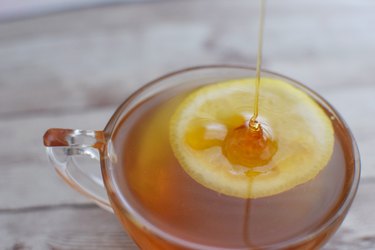
A natural sweetener, honey also boasts medicinal benefits — from treating coughs to burns and more, according to the Mayo Clinic. But, do the health benefits of raw honey extend to your blood pressure and heart? Perhaps, though a healthy diet and exercise remain key to your health.
Honey and Blood Pressure
Video of the Day
While research is limited on whether honey can lower blood pressure, here's how it may come about.
Video of the Day
Blood vessels are lined with a coating of cells, called the endothelium, which can lead to hypertension, the medical term for high blood pressure, if disrupted by inflammation and oxidative stress, explains Carmen Echols, MD, a board-certified family medicine physician in Southeast DeKalb County, Georgia.
Oxidative stress occurs when there's an imbalance in your body between free radicals and antioxidants, Dr. Echols says, but "honey has properties that help to reduce oxidative stress and protect the endothelium from improperly functioning."
Because hypertension can put you at an increased risk for heart failure (when your arteries are narrowed, they are less elastic, making it harder for blood to travel through your body), it's important to keep blood pressure within normal levels, according to the American Heart Association (AHA).
Improving Blood Pressure
A combination of lifestyle changes — a healthier diet, more regular exercise and not smoking, for instance — are the most effective ways to control high blood pressure and avoid or reduce the need for medication, per the Mayo Clinic.
Because blood pressure often increases with weight gain, losing excess weight may also be a way to keep your blood pressure in check. In fact, according to the Mayo Clinic, you may be able to reduce your blood pressure by 1 millimeter of mercury (mm Hg) for every 2.2 pounds you lose.
Antioxidant-rich pure honey could also "have a small positive impact on blood pressure," says Janette Nesheiwat, MD, a family and emergency medicine doctor in New York City and the medical director at CityMD. But, she adds, you need to be mindful of honey's sugar content, especially if you have diabetes. A tablespoon of honey contains 17 grams of sugar and 64 calories; the AHA recommends limiting the amount of added sugars you get daily to no more than 100 to 150 calories.
"I would say the best way to keep your blood pressure within normal limits is to avoid excessive salt, no smoking, exercise, eat a well-balanced diet, get plenty of rest, control your stress and take your medications as prescribed," Dr. Nesheiwat says.
Jeremy Pollock, MD, an internist and cardiologist with the University of Maryland St. Joseph Medical Center, says he would not recommend honey to his patients looking to lower their blood pressure. For people whose blood pressure is not managed well after lifestyle modifications like lowering salt intake, exercising and losing weight, Dr. Pollock says, there are FDA-approved blood pressure medications to help.
Other Possible Health Benefits
The inherent nutrients of raw honey — think: antioxidant vitamins C and E, as well as minerals and prebiotic oligosaccharides, which can aid in feeding gut flora — do make it a valid sweetener option to table sugar. However, it is still a form of sugar, so intake should be limited to 1 to 2 teaspoons a day, according to the Cleveland Clinic.
Beyond use as a natural sweetener, honey's combo of antioxidants, amino acids, iron, zinc and vitamins and minerals with anti-inflammatory and antibacterial properties may help in other ways. For instance, the antioxidants in honey may be associated with a reduced risk for heart disease, according to the Mayo Clinic. Some people also try drinking hot water with honey and lemon for a cough.
The research on honey suggests it may relieve conditions like gastrointestinal disease (such as diarrhea linked to gastroenteritis), neurological disease (offering anti-anxiety, antidepressant and anticonvulsant benefits) and wound care, per the Mayo Clinic. Remember, honey is generally safe for adults and children older than 1 year. Don't give honey to an infant younger than 1 because of the risk for infant botulism.
The takeaway: In moderation, honey won't hurt — and may be just what the doctor ordered.
- Mayo Clinic: “Honey”
- Carmen Echols, MD, family medicine physician, Southeast DeKalb County, Georgia
- Mayo Clinic: “10 Ways to Control High Blood Pressure Without Medication”
- American Heart Association: “Added Sugars”
- Janette Nesheiwat, MD, family and emergency medicine physician, and medical director, City MD, New York, New York
- Jeremy Pollock, MD, cardiologist, University of Maryland St. Joseph Medical Center, Baltimore, Maryland
- American Heart Association: “How High Blood Pressure Can Lead to Heart Failure”
- Cleveland Clinic: “5 Best and Worst Sweeteners: Your Dietitians’ Picks”
Is this an emergency? If you are experiencing serious medical symptoms, please see the National Library of Medicine’s list of signs you need emergency medical attention or call 911.